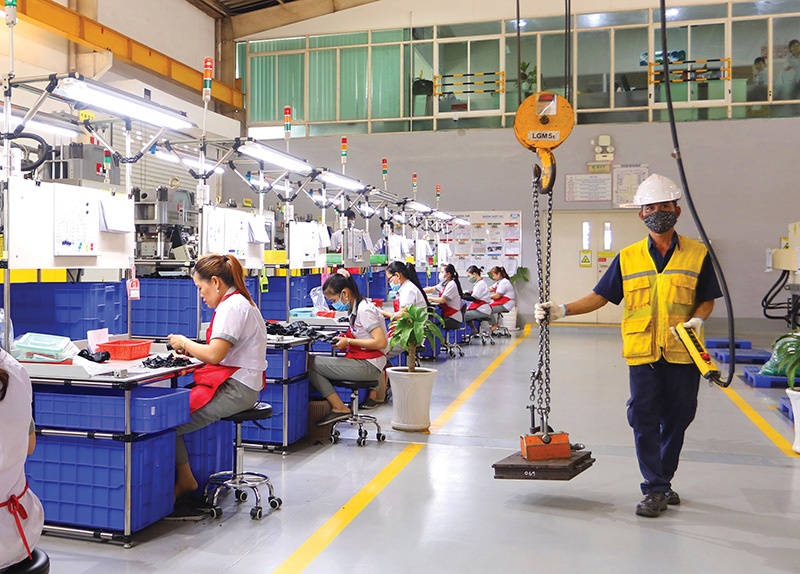Traction gains for enhanced training
 |
| Occupations, both traditional and modern, will require constant adjustments, photo Le Toan |
Colin Blackwell, chairman of the HR Committee at the Vietnam Business Forum, argued that the pandemic radically sped up existing trends like automation, remote work, and the increasing importance of soft skills. These soft skills had always been central to employability, but now they had become essential across all sectors. Vocational programmes on these topics such as creativity, lateral thinking, communication, and problem solving would most benefit employees and employers alike, Blackwell said.
“When it comes to the usage of high-tech solutions, it would not be possible to educate people with just four years of university on the subject, when the technology has not even been around for that long. For these very high-tech topics, vocational training is much more practical in many cases,” Blackwell said.
However, the technical and vocational education and training (TVET) system, as well as graduates’ abilities, do not yet meet the demands of the rapidly changing labour market. Experts said that this comes from a lack of business participation in TVET, outdated training programmes, and insufficient personnel competencies.
As a result, vocational education has a bad reputation and low enrolment rate. The pandemic has highlighted the need for a more open and flexible TVET system that takes advantage of the digital revolution and prepares students properly, Blackwell added.
Business requirements advance so rapidly that on-the-job training becomes the main route to gaining skills for employees. Most large reputable companies in Vietnam, both foreign and local, usually have extensive inhouse training programmes – a combination of updating technical skills and the acquisition of soft skills such as leadership.
Blackwell said that smaller companies will often still provide staff development through external training programmes, and chambers of commerce and industry are also valuable in continuous professional development for managers.
Some foreign companies have invested in vocational training programmes to develop their human resources. Bosch, Vietnam’s largest German investor, employs more than 2,000 engineers. To further drive the company’s growth, Bosch continues to fortify its commitment to reskilling and upskilling the labour force with existing initiatives, such as offering German-standard apprenticeships since 2013 and establishing collaboration with local universities to build AI expertise for employees.
Meanwhile, Germany’s automotive industry company Schaeffler has expanded its global apprenticeship programme since last year. The programme in partnership with Lilama2 International Technology College focuses on developing a highly-skilled workforce for industries in Vietnam by providing enrolled students with advanced training according to German standards. Vietnam is also the first location in Southeast Asia where Schaeffler has introduced the long-standing tradition of the German dual training system.
Juergen Hartwig, programme director at GIZ shared, “Based on German and other international experiences and best practices, the involvement of enterprises, business associations, chambers, and unions is essential for any high-quality TVET system. Businesses and social partners need to advise the Vietnamese government in all relevant policies regarding the further development and promotion of the TVET system to ensure that skills and competences taught at institutes and at enterprises match the labour market’s needs.”
Hartwig added that they also need to closely cooperate with institutes in curriculum development, recruitment of students, in-company training phases, and assessment of graduates. This ensures opportunities for decent employment for graduates and a productive and sustainable development of the economy.
In line with the amended Labour Code effective from January, Hartwig recommends the establishment of skills councils at national, sectoral, provincial, and institute levels. One of the main functions of these councils would be the development and update of occupational standards and the proposal of new occupations in a specific business sector. The councils would be responsible for organising joint training and assessments of students at institutes and on the job.
In 2020, with technical support from GIZ, the Directorate of Vocational Education and Training (DVET) issued training programmes for in-company trainers, which is deemed essential for cooperative training between institutes and enterprises.
The Programme Reform of TVET, financed by the German government and implemented by GIZ together with DVET, has successfully piloted this approach at the Lilama and HVCT colleges in the southern province of Dong Nai and Ho Chi Minh City. Now, it has been disseminated to 11 colleges in different parts of Vietnam. The modular programmes developed for seven technical occupations follow Vietnamese requirements and are also certified to be equivalent to German standards.
With regards to the upcoming changes to vocational training programmes, Hartwig commented the rapid transformation started before the pandemic and has been caused by digital transformation and the requirements of a green economy.
“Today, every occupation needs to be modernised and the standards and training programmes need frequent adaptations and updates in a rapidly changing business environment. Some new occupations must be developed. Finally, we need flexible re- and upskilling programmes to enable lifelong learning and skills development,” he added.
What the stars mean:
★ Poor ★ ★ Promising ★★★ Good ★★★★ Very good ★★★★★ Exceptional
Related Contents
Latest News
More News
- NAB Innovation Centre underscores Vietnam’s appeal for tech investment (January 30, 2026 | 11:16)
- Vietnam moves towards market-based fuel management with E10 rollout (January 30, 2026 | 11:10)
- Vietnam startup funding enters a period of capital reset (January 30, 2026 | 11:06)
- Vietnam strengthens public debt management with World Bank and IMF (January 30, 2026 | 11:00)
- PM inspects APEC 2027 project progress in An Giang province (January 29, 2026 | 09:00)
- Vietnam among the world’s top 15 trading nations (January 28, 2026 | 17:12)
- Vietnam accelerates preparations for arbitration centre linked to new financial hub (January 28, 2026 | 17:09)
- Vietnam's IPO market on recovery trajectory (January 28, 2026 | 17:04)
- Digital economy takes centre stage in Vietnam’s new growth model (January 28, 2026 | 11:43)
- EU Council president to visit Vietnam amid partnership upgrade (January 28, 2026 | 11:00)

 Tag:
Tag:




















 Mobile Version
Mobile Version